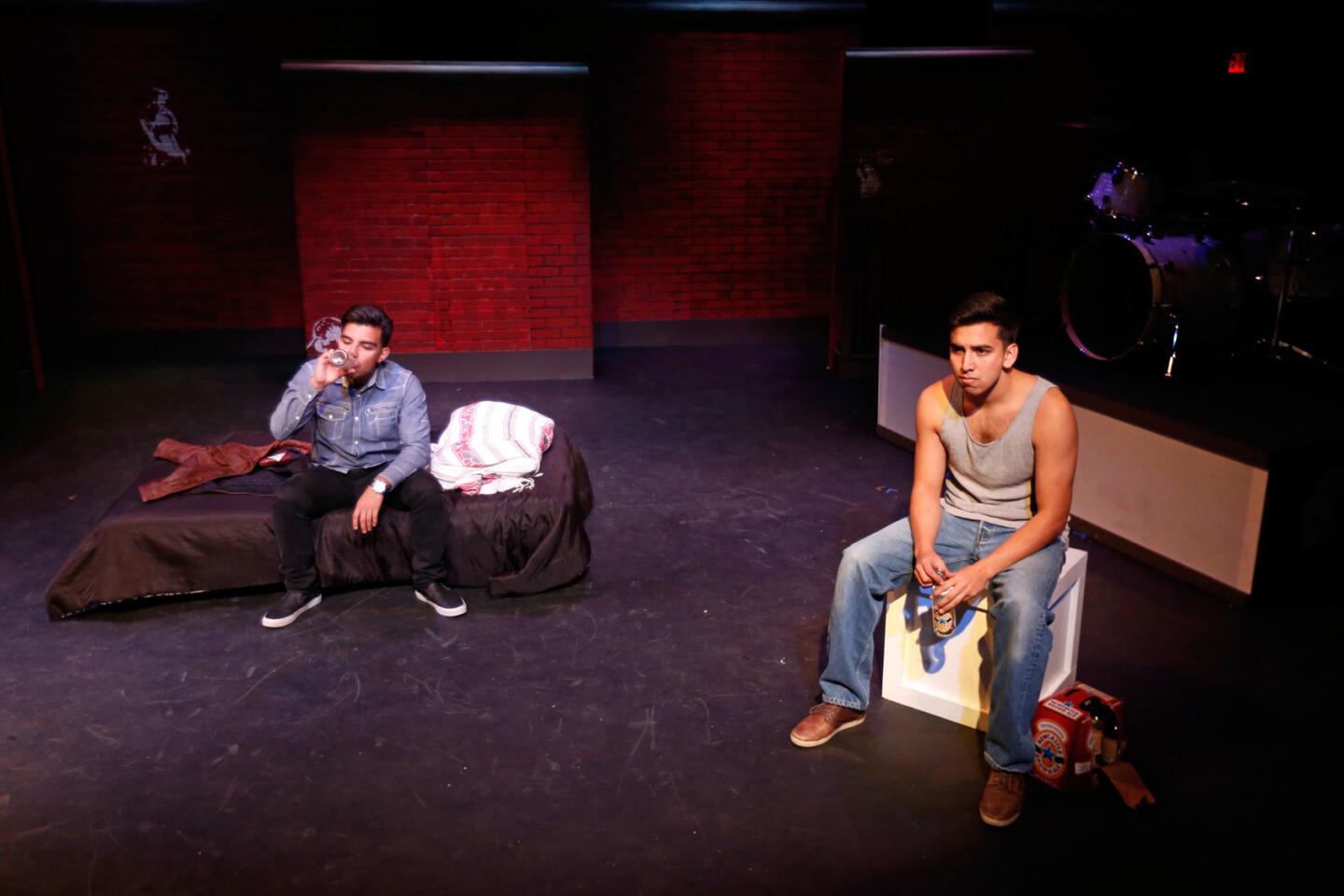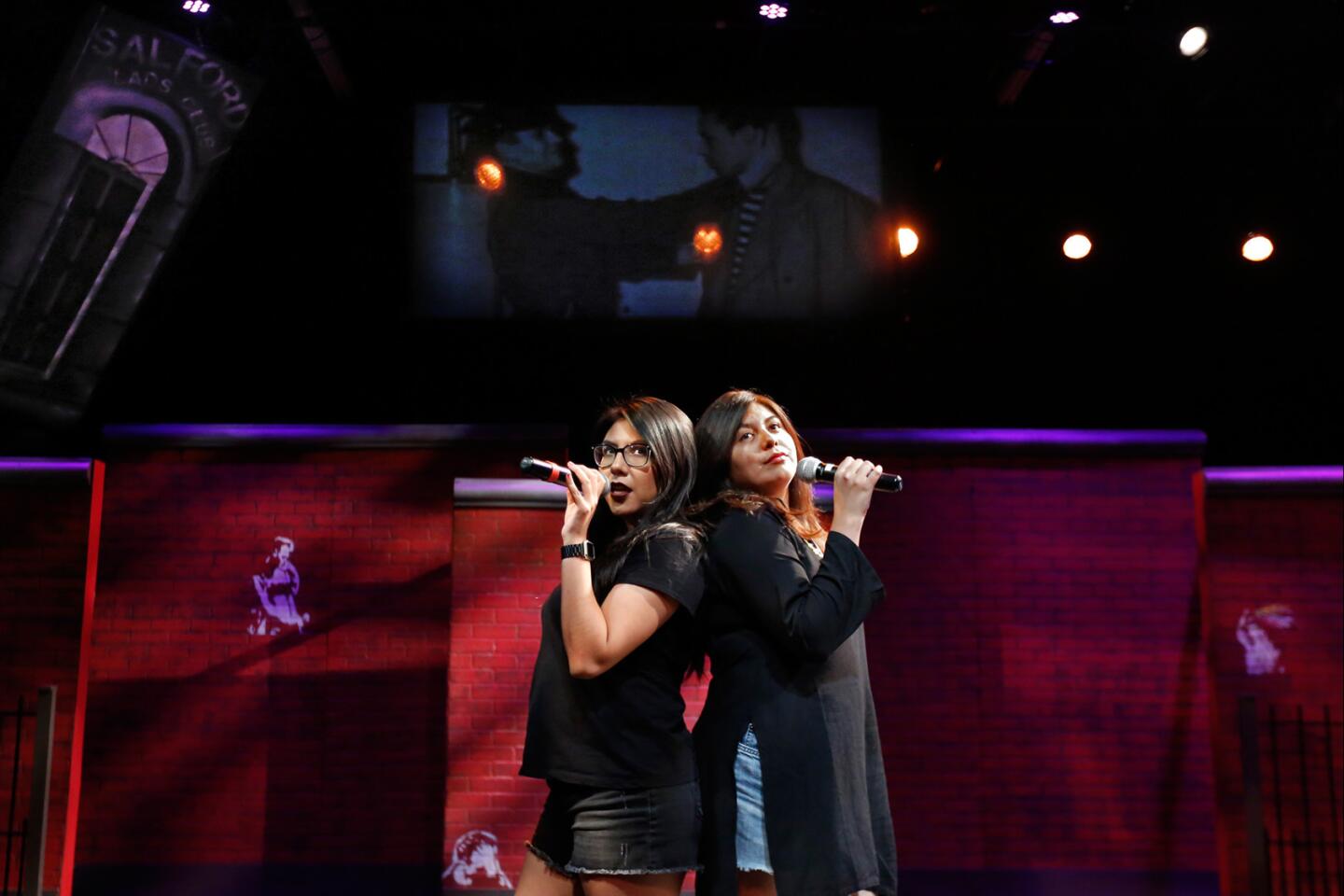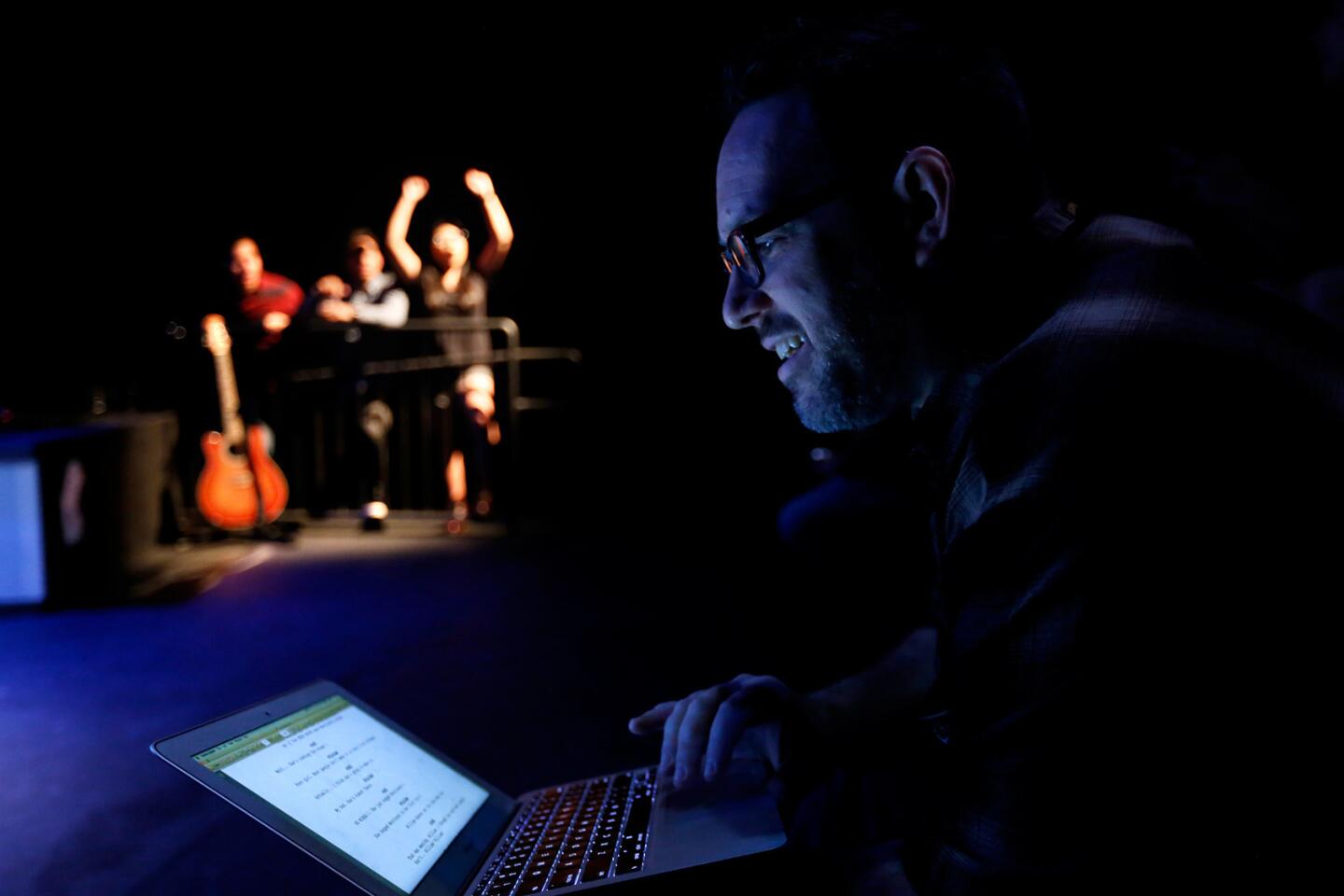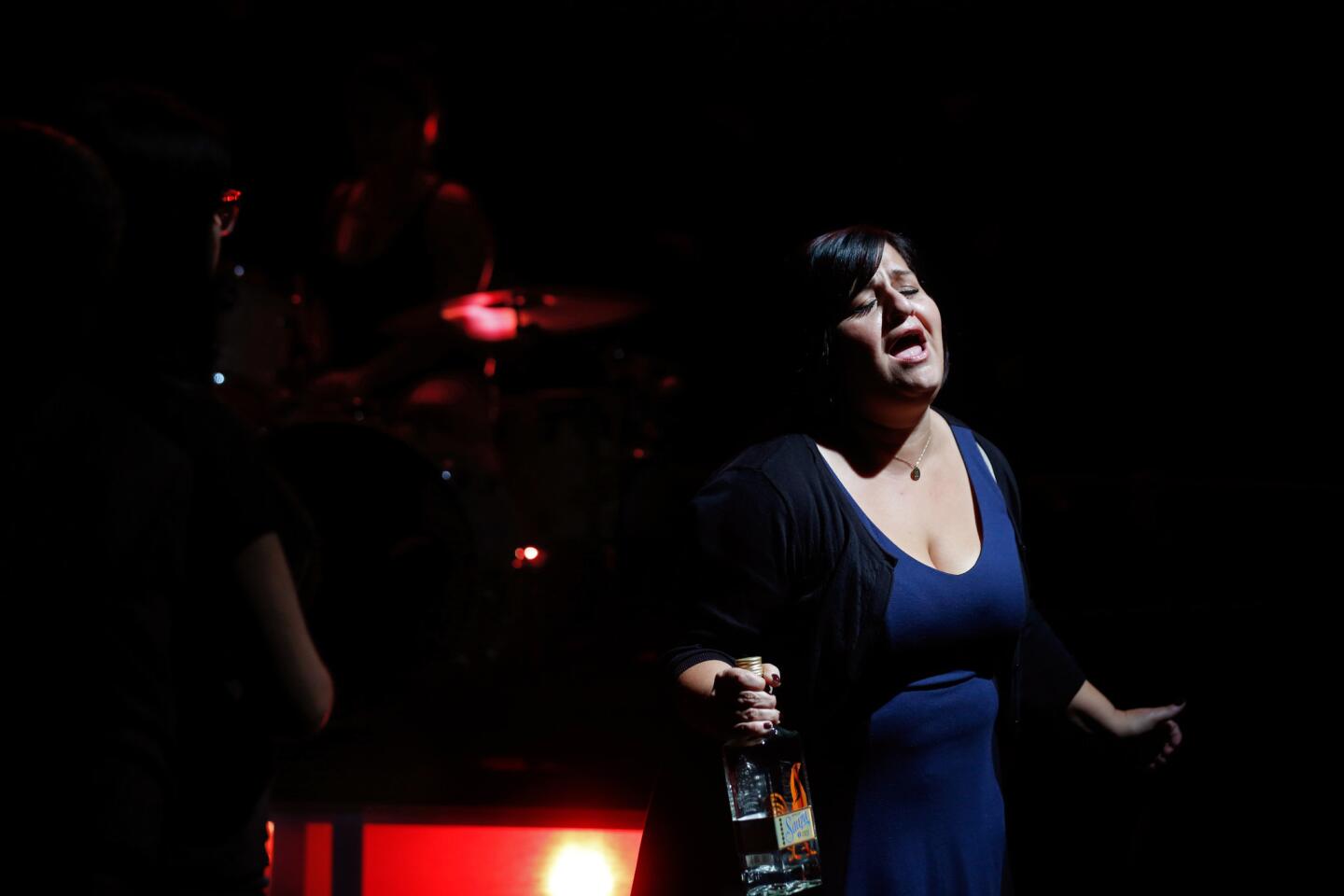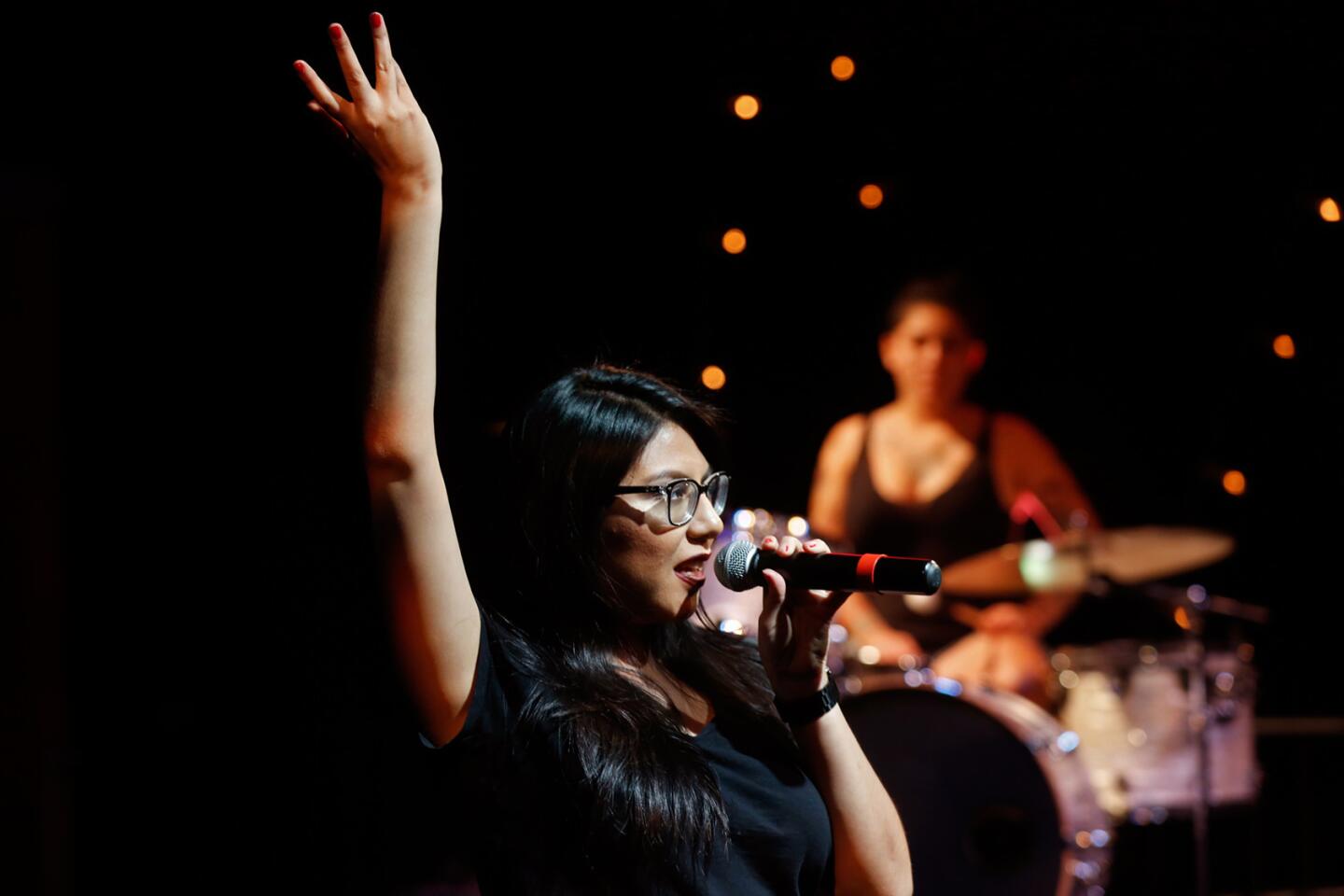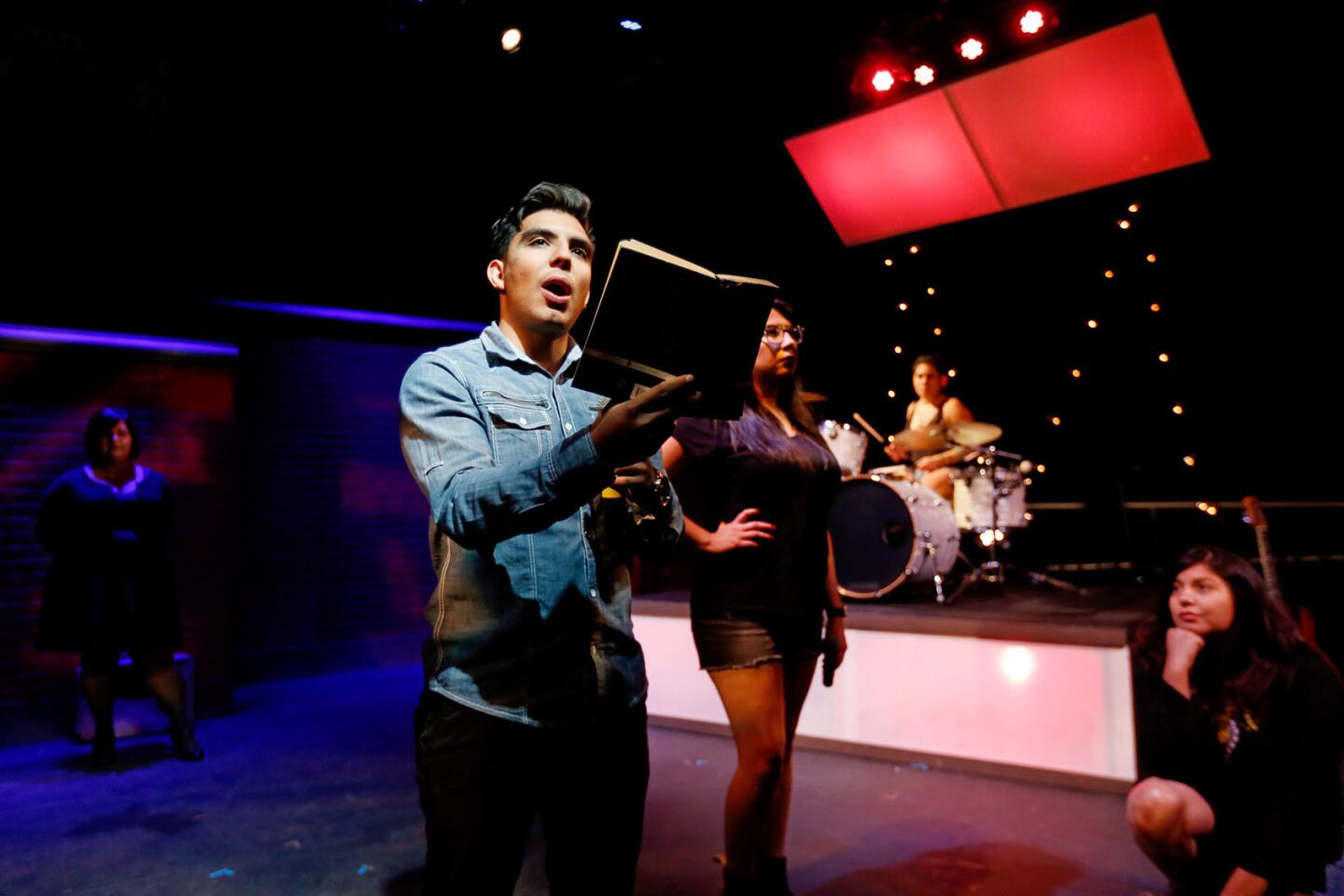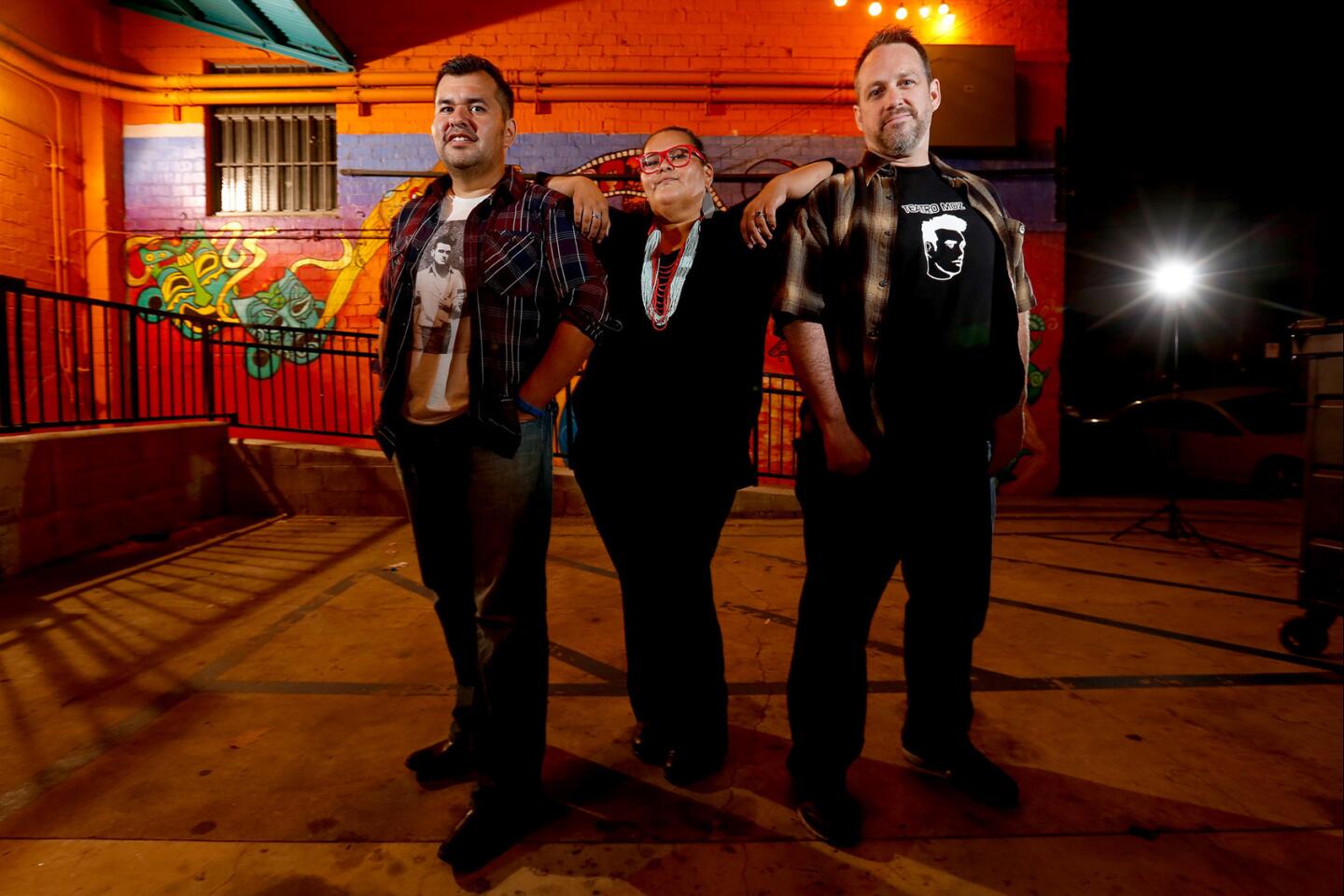‘Teatro Moz’: A theater festival in Boyle Heights takes on love, loss and the Mexican fascination with Morrissey

“Teatro Moz,” a series of short plays inspired by the Mexican-American fandom devoted to former Smiths frontman, Morrissey.
- Share via
Two years ago, Casa 0101 theater in Boyle Heights held an open call for short plays about, inspired by and tangentially touching on the life, times or melancholy of singer Morrissey — renowned for his love of gladiolas and his enmity toward meat. The theater received dozens of entries, including several from Europe, and staged a night of readings, which sold out on the spot.
Now Casa 0101 is hosting a festival devoted to some of the best plays from that open call. “Teatro Moz” explores the Mexican affinity for the former Smiths frontman, or “Moz,” as he is affectionately known.
It is not the first such tribute to the singer in Los Angeles — a.k.a. “Moz Angeles” to his fans. The Boyle Heights bar Eastside Luv holds occasional Morrissey karaoke nights (otherwise known as “Morrisseyoke”), and last year the Mexican band Mexrrissey played a well-attended gig at the Regent in downtown.
But “Teatro Moz” offers a deeper examination at the phenomenon.
While the show can be funny — featuring, for example, a story about a woman who falls head over heels for a Morrissey impersonator — it also casts a spotlight on a host of important issues. Co-director Michael Patrick Spillers describes it as “a series of intersections — of LGBT issues, Latino issues, music and more. You will find all of these connections you wouldn’t have thought of.”
The heartbreak, sexual ambiguity and obsessive fandom are all brought together by the music — which, of course, is of the lugubrious sort.
“Teatro Moz” features a full band that includes Alexandro Hernandez from El Mariachi Manchester and Toni Santoyo from Sheilas Take a Bow, two L.A.-based Morrissey tribute acts. As part of the show, the band offers its takes on Morrissey classics such as “First of the Gang to Die” and “Suedehead.” (Sample lyric: “Why do you come here / When you know it makes things hard for me?”)
Things kick off with a wild opening number that explains the Mexican love of all things Morrissey — from the ways in which the singer channels first-generation alienation (he was the son of Irish immigrants raised England) to his penchant for mournful lyrics.
“They are painful, but they are so beautiful,” says Elvia Rubalcava, who co-directed “Teatro Moz.” In this way, Morrissey’s work mirrors a lot of traditional Mexican music, she says: “Growing up, my parents listened to a lot of music — my mom singing Lola Beltran and Juan Gabriel. The lyrics, how deep they are.”
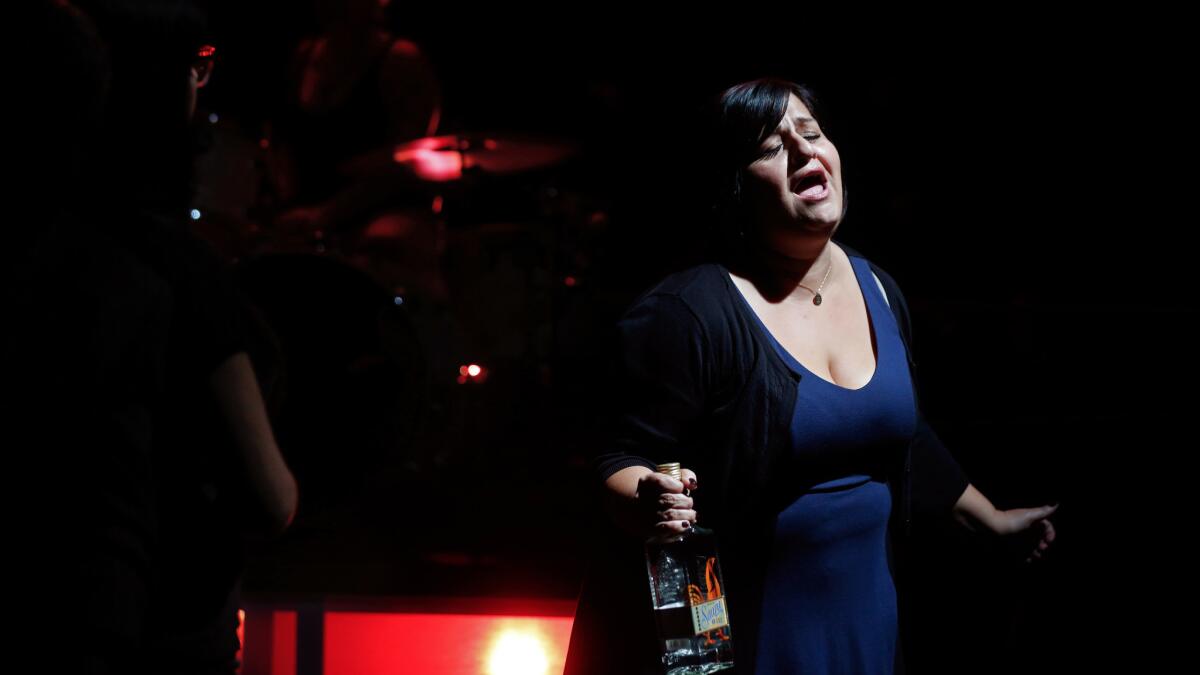
With my friends, even the ones who were heterosexual, we couldn’t talk sports, but we could talk about Morrissey. It was like our secret little language.
— Playwright Jaime Mayorquin
The show consists of eight short plays, with titles such as “Menudo Is Murder,” that range from the slapstick (a pair of fans trying to crash the stage so they might touch the Pope of Mope) to the poignant (a transgender teen attempting to secure his father’s permission for hormone treatments).
Jaime Mayorquin, who helped produce the show and wrote one of the plays, is a lifelong Morrissey fan.
“My first memory of his music was my sister opening her shipment of Columbia House CDs,” he says. “There was the Cure, Depeche Mode and at least four by the Smiths and Morrissey. I remember stealing those CDs and loving it right away. The lyrics sucked me in — the romance and the darkness.”
His play, titled “My Love Life,” addresses sexuality. It centers on two young Mexican American men coming to terms with their attraction for one another — a theme inspired, in part, by his own experiences as a teenager.
“With my friends, even the ones who were heterosexual, we couldn’t talk sports, but we could talk about Morrissey,” he says. “We could quote pieces of Morrissey to each other. It was like our secret little language.”
Morrissey, he says, captures a contradiction in Mexican society: “Part of our culture is this very macho culture. But at the same time you have men who cry through rancheras.”
With a wink and a nod, “Teatro Moz” also touches on a range of other issues.
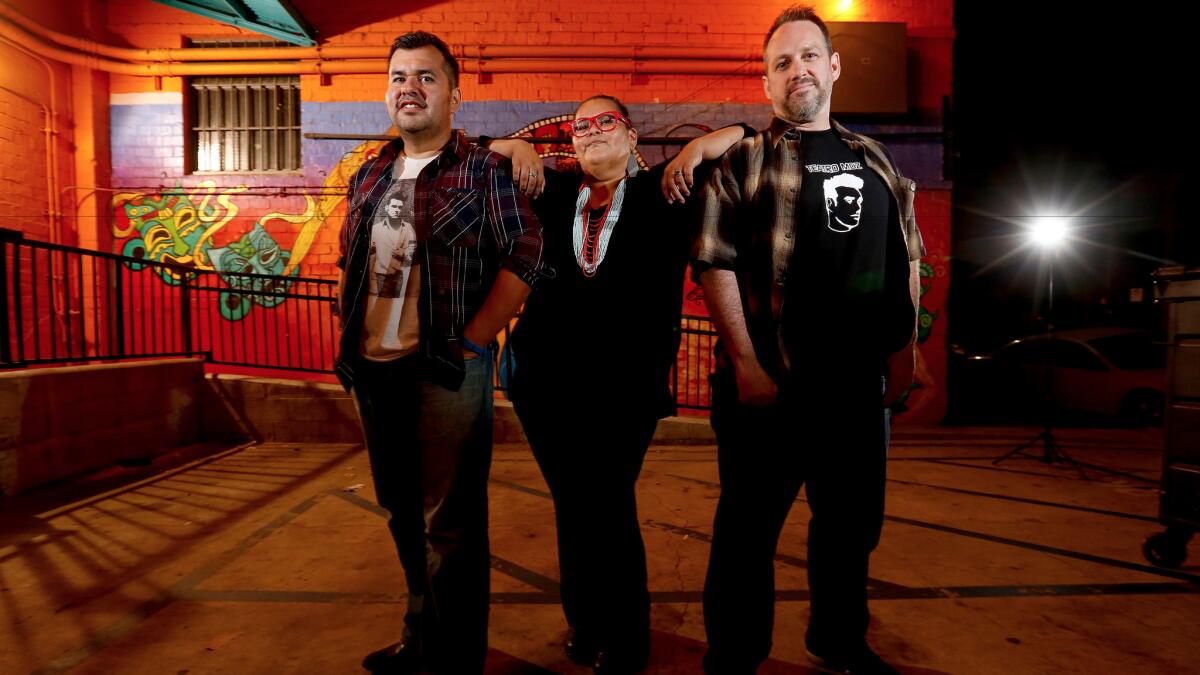
Rubalcava, a writer who has worked with Casa 0101 on half a dozen shows, contributed the play “Porfas, Porfas, Porfas” — inspired by the 1984 Smiths tune “Please, Please, Please Let Me Get What I Want.” The play is about three Chicanas trying to make their way through college while contending with issues of money, depression and family.
“[Morrissey] doesn’t sugarcoat life — it’s raw,” Rubalcava says. “And I like that these actors get to play these raw situations. Some of them are funny and some are sad. There are some parts, which even though I’ve seen it a million times, I get choked up.”
Spillers, who in addition to writing the buoyant opening act also penned “Whittier Boulevard,” about the family struggles facing a transgender man, says the plays are brought together by Morrissey but also by something more profound.
“I think loss is a big thing that brings it all together,” he says. “Morrissey experienced loss at a young age. And when I sat back and looked at the eight pieces we selected, I realized that loss is a recurring motif — the loss of a family member, of a brother, of a son.”
But there is plenty of humor too: Two hungover dudes discussing their favorite Moz songs, a Morrissey impersonator on the hunt for a hamburger and even a Rickroll. Here and there, Morrissey lyrics are woven into the dialogue.
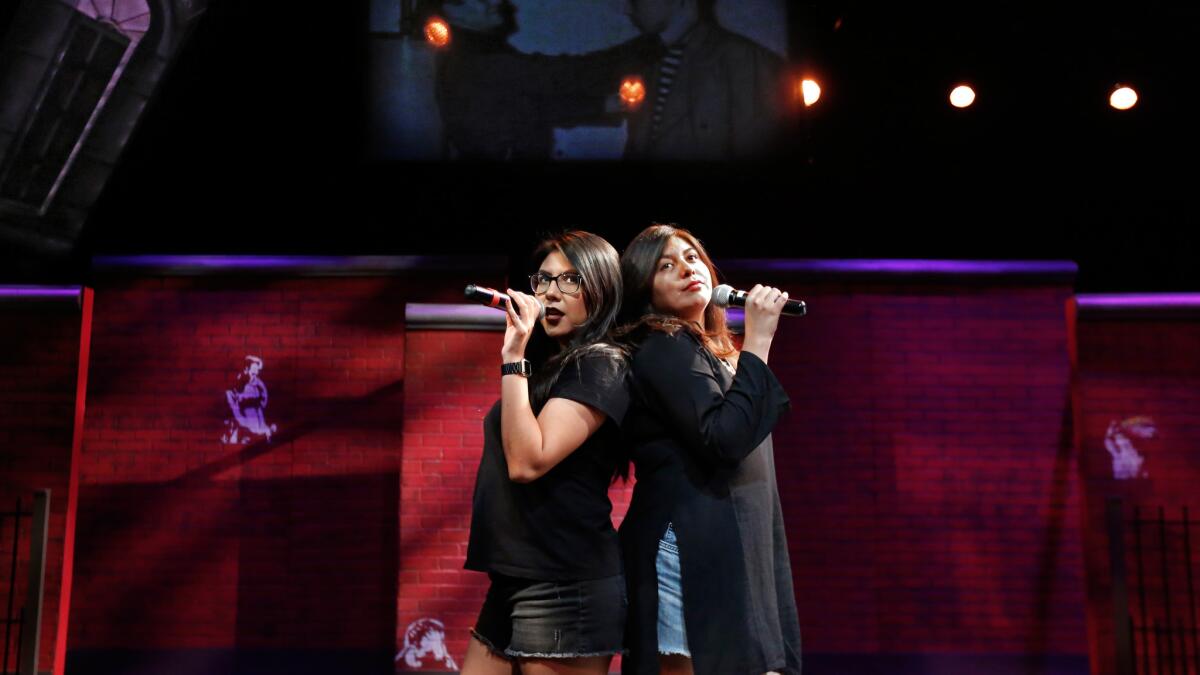
Mayorquin says he functioned as the production’s Morrissey police during rehearsals. “I was the annoying voice on the side,” he says, chuckling. “If an actor changed a Morrissey reference, I’d say, ‘Um, no. Not that!’”
In the end, he says, the show is a gift.
“I’m so glad that I’m able to give back to an artist who has meant so much to my life,” he says. “Whether he sees it or not.”
Who knows? Perhaps the poet from Manchester has some time on his hands for an evening of theater in his name.
+++
Where: Casa 0101, 2102 E. 1st St., Boyle Heights, Los Angeles
When: Thursday through Saturday at 8 p.m., Sundays at 5 p.m., through Oct. 16
Tickets: $25 general, $22 students, $20 for Boyle Heights residents
Info: casa0101.org
Sign up for our weekly Essential Arts & Culture newsletter »
Find me on Twitter @cmonstah.
ALSO:
Mexrrissey: The phenomenon that created a Mexican supergroup
Premiere: Mexrrissey reworks Morrissey’s ‘Suedehead’ as ‘Estuvo Bien’
In Yuri Herrera’s hard-boiled ‘The Transmigration of Bodies,’ dirty work is providence
More to Read
The biggest entertainment stories
Get our big stories about Hollywood, film, television, music, arts, culture and more right in your inbox as soon as they publish.
You may occasionally receive promotional content from the Los Angeles Times.
